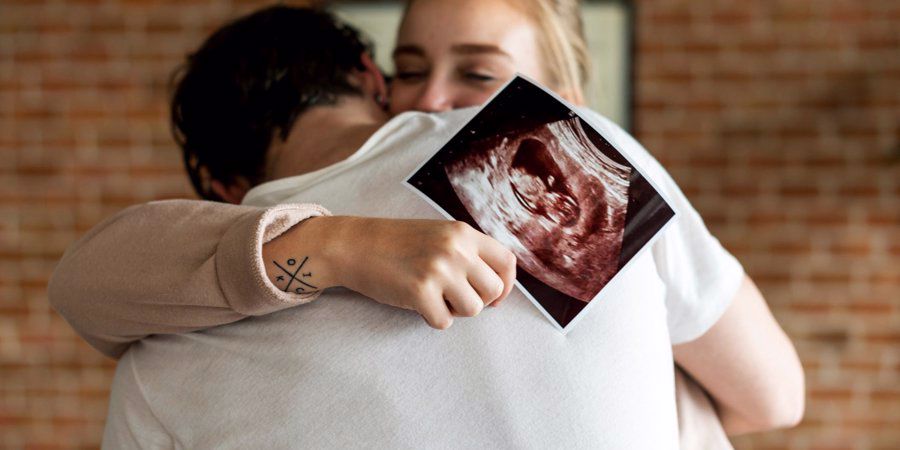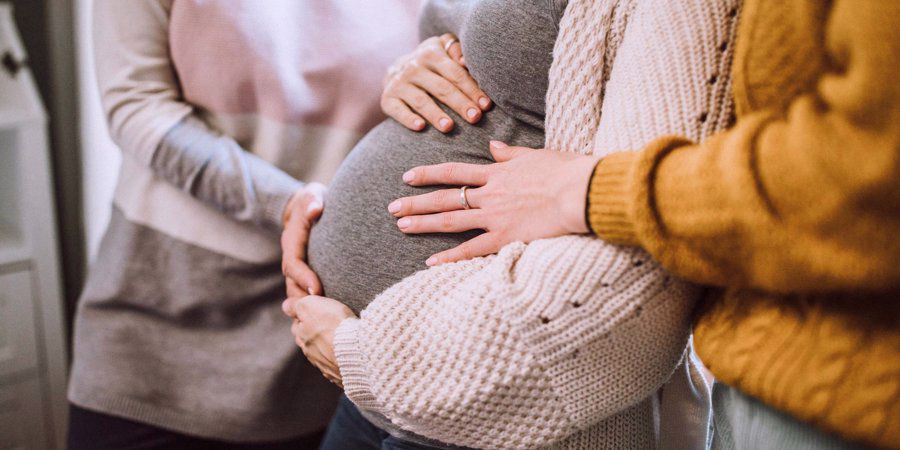Whether you’re trying to conceive or already pregnant, our step-by-step guide tells you all you need to know about all your milestones up until the big day. Please bear in mind that every pregnancy advances at a different rate, so these timescales are just an average guide.
If you are concerned about anything to do with your pregnancy, even something minor, please seek advice from your midwife, GP or a healthcare professional.
[Read more: 10 Foods and Drinks to Avoid Whilst Pregnant]
The first month
Your pregnancy and due date are calculated using the first day of your last period, rather than when you actually conceived. Therefore, there are a few days at the start of your ‘pregnancy’ where you aren’t actually pregnant, but it’s only relevant for the dates!
Your pregnancy starts with implantation. This is when a sperm cell fertilises an egg in one of your ovaries, the egg moves along the fallopian tube and then implants itself into the lining of your womb. By this stage, the fertilised egg has divided into more than 100 cells and is classed as an embryo.
Weeks four to six
The embryo inside your womb starts to develop and grow and is enclosed within an amniotic sac. The outside layer of this sac will develop into the placenta, which grows in the wall of the womb. It is the placenta that delivers all of the nutrients and oxygen that your baby needs throughout the whole pregnancy. The placenta is ‘delivered’ after your baby is born.
[Read more: 5 Things You Can Do With Your Placenta Post-Birth]
The embryo will start to develop its heart and blood vessels, with some blood already circulating. Some of these blood vessels will grow into the umbilical cord, which connects your baby and you.
It is around this time that you may experience a missed period or believe that you may be pregnant. Using a home pregnancy test or blood test through your GP will confirm whether you have the high levels of hCG hormone which indicate that you are pregnant. The levels of this hormone will be at their highest during the first sixteen weeks of your pregnancy and then they will level off.
At four weeks, the cells of your embryo form into layers. The outer cells link in with your blood supply. The inner cells transform into three layers, which become your embryo’s organs and body. The innermost layer forms the digestive and breathing systems, which includes the stomach, gut, bladder and lungs. The outside layer forms into the brain and nervous system, as well as the nails and skin. There is also a middle layer which forms into the muscles, bones, blood vessels and heart.
Weeks seven to ten
At around six to seven weeks, the embryo starts developing its brain and head. If you were able to see it, it would look like a small tadpole. There are small bumps where the limbs and ears will develop from and you would see a thickened area for eyes. Your embryo has a very thin layer of skin at this stage.
At seven weeks the embryo’s brain is growing quickly thanks to nerve cells multiplying at pace. This means that the head is growing at a faster pace than the rest of the body at this stage. Although the outer part of the ear isn’t visible yet, the inner ear is developing.
By eight weeks, the embryo is now called a foetus but it is not yet receiving nourishment from the placenta. You may have missed your second period by this point and are probably starting to experience some early pregnancy symptoms. Feeling nauseous or vomiting, having sore or enlarged breasts and feeling more tired are all typical of this stage. Morning sickness usually settles down by around fourteen weeks of pregnancy. Your womb will have expanded but only to the size of a lemon, so you’re unlikely to have a noticeable bump at this stage.
[Read more: Morning Sickness & Ways To Ease It]
During week nine, your foetus’ face will be developing more and more. Their eyes are growing and start to have some colour in them, plus the mouth and tongue grow too. Your foetus’ internal organs will be developing including the heart, lungs, brain, kidneys and intestines. They will also have ridges on their hands and feet which will separate out into the toes and fingers. If you measured your foetus, they would be around 2.2cm from head to bottom.
At week ten your foetus develops even more of their facial features, with lips and nostrils becoming visible as well as a jawbone containing all of their teeth. Their heart is now fully formed and beats at a rate two to three times faster than adults. The increased heartbeat continues until after your baby is born.
During this time you may have a ‘booking in’ appointment with a midwife. This is the first set of checks of your health and starting to plan for your antenatal care. Your midwife may take a blood test from you and will measure your weight.

Weeks eleven to fourteen
Your placenta continues to grow at a rapid rate and will be fully formed by twelve weeks, ready to start giving your baby its vital nourishment. Your foetus is also growing at a pace, with the facial bones fully formed and the ears becoming a more familiar shape.
At twelve weeks, the foetus has all of their organs, limbs, muscles and bones plus the sex organs are developed too. The cartilage that currently makes up the skeleton of your foetus will start transitioning into bone.
You will be offered your first ultrasound scan between eight and fourteen weeks, it will likely to be around twelve weeks so that certain measurements can be taken. The scan is not painful and it’s a very exciting moment to see your baby for the first time.
By week fourteen, our foetus has grown to 8.5cm long from their head to their bottom. They have started swallow tiny amount of amniotic fluid and they will pass this through their system as urine, with the fluid being reabsorbed into the amniotic fluid.
[Read more: Food Cravings During Pregnancy]
Weeks fifteen to nineteen
If you have been experiencing morning sickness it may ease off around now, although for some women it does continue until later on in their pregnancy.
At fifteen weeks, your foetus’ ears will start to hear noises from inside your body as well as distant sounds from around you. Their eyes may be able to react to a bright light away from the womb, although their eyes are actually closed.
At sixteen weeks, your foetus has a nervous system which is developed enough to make small muscle movements. They may also be able to make a fist with their hands or even hold their hands together.
By seventeen weeks, your foetus weighs around 150g and they are being to look more human. They can open and move their eyes and mouth, although their eyelids are shut. Their fingerprints have formed as well as the nails on their fingers and toes. Your foetus will be moving around a lot, especially in response to loud sounds around you. You may not be able to feel their movements just yet but it won’t be too long.
[Read more: The Nine Stages Of Pregnancy]
Weeks twenty to twenty-six
Congratulations, you’re halfway through! Twenty weeks represents an exciting time, with a second ultrasound scan and being able to find out the sex of your baby (if you want to). You won’t see it on the scan but your baby is now covered in a substance called vernix. This is a yellowy white waxy substance which protects your baby’s delicate skin whilst they are in the womb.
You may have started feeling your baby move around now, and they may have a pattern of movements at specific times of the day or in certain circumstances. Their movements will become stronger as you move through the second half of your pregnancy. If you have any concerns about your baby’s movements, seek advice from your midwife, GP or maternity department at the hospital. Nobody will mind giving you reassurance.
[Read more: Coping With Gender Disappointment]
You may notice a dark line along the middle of your tummy, from your belly button downwards. This is very normal and is just a sign of your stomach expanding. You may also start to see some stretch marks on the sides of your bump. There are many creams and lotions available to try and reduce the impact of stretch marks, plus it's very important to keep yourself healthy and hydrated.
Between seventeen and twenty-one weeks your baby will have more than doubled in size and weighs about 350g. It is from this point that your baby takes over weighing more than the placenta. Before this, the placenta was heavier. It does keep growing, but not at the same rate as your baby.
Alongside the waxy vernix covering, your baby will also be covered in lanugo which is a very soft fine hair. This may be present at birth but they will shed it very soon after. Your baby will be getting all the oxygen it needs through the placenta but will be starting to practice the movements of breathing. Its lungs need to develop a bit more to be able to breathe independently at birth.
You may find that your baby has more of a pattern of being awake, with plenty of moving around, and sleeping. This may not necessarily be at the same times that you sleep, so you may find that you’re kept awake. There is an urban myth that the times your baby sleeps when in the womb is what they will do after the birth, but there’s no scientific evidence proving this! Loud noises may make your baby move around more, as well as specific voices or music. You may also be able to tell when they have hiccups. Your baby will open their eyelids for the first time and will start blinking soon.
At twenty-four weeks, your baby has a chance of survival if they are born prematurely because their vital organs and lungs are developed sufficiently. Your baby would need a significant amount of neo-natal care if they are born this early.
You may feel that you have a bump showing now but every woman looks different, especially for second or third babies. Try not to compare yourself to other pregnant women and be aware that you will receive plenty of comments!
Between sixteen and thirty-two weeks you will be offered to have a whooping cough vaccination to protect your baby. This may be given in conjunction with the flu vaccine if it is during the autumn and winter months.
[Read more: 20 Things You Can and Can't Do Whilst Pregnant]

Weeks twenty-seven to thirty
At twenty-eight weeks, your baby weighs 1kg, which is the same as a bag of flour. Their body is fully formed but not matured yet, and development is still taking place. Their heartbeat has slowed down but it will still be faster than yours. If you hear their heartbeat through a doppler at an antenatal appointment it may sound like a fast train or horse race.
Your baby will be taking up more and more space in your tummy, meaning that you may find that you can not eat large meals or get indigestion easily. You may also find that you get fluid retention in your legs or arms, leading to puffiness. Drink plenty of fluids and put your feet up to try and ease this. Make sure that you do mention any swelling to your midwife or GP so that they can check for pre-eclampsia. High blood pressure and protein in your urine can also be signs of this, and it needs to be treated
At about twenty-six weeks you may start looking into what your preferences are for your labour and birth and preparing a birth plan. There is plenty of information available about the types of birth available in your area, including home births, water births and assisted births. If you do complete a birth plan, it is a good idea to talk it through with the person who will be present with you at birth. This is so that they can communicate your wishes if you are not able to.
[Read more: Tips on Choosing a Birth Plan]
Your baby will be developing their sucking reflex and maybe sucking on its fingers or thumb. There is no link between this and whether they will suck their thumb after birth. Your baby will be putting on weight as fast, with the skin becoming smoother and looking less wrinkled. They will still be wrinkly when they are born. Your baby’s lungs are still developing but they won’t be able to fully breathe by themselves until around thirty-six weeks.
Weeks thirty-one to thirty-six
At thirty-one to thirty-two weeks, you will have an appointment with your midwife. They will discuss any test results, check your blood pressure and your bump size will be measured. Your midwife will also identify where your baby is inside your womb. Your baby may have moved into an upside-down position with their head pointing downwards. This is the position that they need to be in ready for a vaginal birth. If your baby is in a position with their head up, this is called breech. Your baby may still turn into the downwards position from breech, or you may be offered the option to try and turn them in your womb. Your midwife will refer you to the hospital for this, and the procedure will be fully explained. It is voluntary but may not be effective.
At thirty-three weeks, your baby’s brain and nervous system will have developed fully and their bones will be hardening. Their skull bones stay soft until after you have given birth. This is so that their journey through the birth canal becomes easier, the bones will move so that the head can be born but the brain stays protected. You may notice that you can see your baby’s movements sticking out of your stomach.
At thirty-six weeks, your baby would be able to breathe independently after birth and would also be able to digest breast milk. From this point, make sure that you have your birth arrangements in place such as having your hospital bag packed and any childcare requirements organised. Make sure that you understand the signs of early labour and when you should contact your birth unit or midwife.
[Read more: Hospital Bag Essentials & When to Pack]
You may start experiencing Braxton Hicks contractions. This is when your uterus tightens as a practice for your actual labour. If the contractions are frequent or painful, or you experience any other early labour signs get in contact with your midwife or hospital.
Week thirty-seven onwards
Your pregnancy is considered to be 'full term' when you reach thirty-seven weeks, and your baby will weigh around 3-4 kg at this point (this is equivalent to 6.6 to 8.8 pounds). From this point onwards, your baby may move downwards even further into your pelvis. This is known as being ‘engaged’ and your midwife may be able to measure the percentage of engagement. Your baby may not become engaged until the actual birth, and this is perfectly normal.
Keeping Yourself Healthy
It’s important to maintain a healthy lifestyle from when you are trying to conceive, right through pregnancy and after birth. By doing so, you are giving yourself and your baby the best chance to develop properly and have a straightforward pregnancy and birth. Here are some easy tips:
- stay hydrated – your baby needs plenty of hydration so you may need to up your fluid intake. Try to restrict the amount of caffeine you consume and you may want to stay away from fizzy drinks, as they can cause hiccups (for both of you)
- eat a healthy diet – make sure you are eating plenty of fruit and vegetables as well as proteins and carbohydrates. Whilst you may experience some cravings, keep an eye on your weight gain. You don’t actually need to eat a lot more calories each day.
- stay active – if you already have an exercise programme, you can continue this throughout pregnancy, although it is advisable to discuss this with your midwife or GP. It’s important to keep active throughout your whole pregnancy, even gentle exercise like walking, swimming or yoga is beneficial. It will help your body cope with the demands of pregnancy and also helps your recovery after birth.
- existing medical conditions – if you have any medical conditions, make sure you discuss these with your GP or midwife, as they may mean that you need extra antenatal care or appointments.
[Read more: How to Pick the Perfect Baby Name]

Most importantly, if you have any worries or questions about your pregnancy or baby, seek professional medical advice. Midwives, Gps and hospital staff are experienced and knowledgeable and won’t turn you away, however, minor your concern. Whilst it may be tempting to self-diagnose, especially online, every woman and baby is different and you should get your individual circumstances checked. Also, the experiences of friends and relatives may be very different from your own, especially around the recommendations given to previous generations. For example, you may find ‘guidance’ on how often your baby should be kicking per hour, but this may not be the most up to date advice. Always seek out the NHS or official advice on things such as this.
Above all, try to relax and enjoy your pregnancy. Remember that you are doing an amazing thing and growing a new life, that will become your beautiful baby after about forty weeks.





